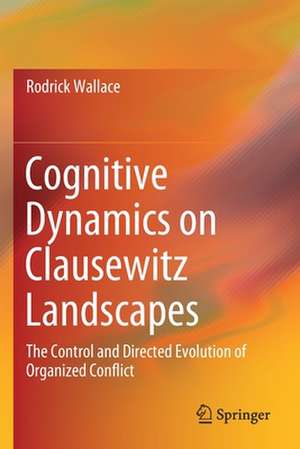Cognitive Dynamics on Clausewitz Landscapes: The Control and Directed Evolution of Organized Conflict
Autor Rodrick Wallaceen Limba Engleză Paperback – 29 aug 2020
A central feature of the book is a formal description of the famous OODA loop of the US military theorist John Boyd in terms of the Data Rate Theorem that links control and information theories. That description is expanded to cover more fully the impact of stochastic fog-of-war effects on tactical and operational scales of conflict. Subsequent chapters examine in more detail the role of doctrine, and the particular effect of embedding culture on cognitive and Lamarckian evolutionary processes associated with conflict on tactical, operational, and strategic scales and levels of organization. A scientifically sophisticated exercise in applied mathematics, history, evolutionary theory, and ecosystem theory, this book will be appropriate for researchers and students interested in defense, security, and international relations, as well as non-academic career professionals in government and industry.
| Toate formatele și edițiile | Preț | Express |
|---|---|---|
| Paperback (1) | 381.81 lei 6-8 săpt. | |
| Springer International Publishing – 29 aug 2020 | 381.81 lei 6-8 săpt. | |
| Hardback (1) | 388.90 lei 6-8 săpt. | |
| Springer International Publishing – 29 aug 2019 | 388.90 lei 6-8 săpt. |
Preț: 381.81 lei
Nou
Puncte Express: 573
Preț estimativ în valută:
73.08€ • 79.41$ • 61.43£
73.08€ • 79.41$ • 61.43£
Carte tipărită la comandă
Livrare economică 21 aprilie-05 mai
Preluare comenzi: 021 569.72.76
Specificații
ISBN-13: 9783030264260
ISBN-10: 3030264262
Pagini: 165
Ilustrații: XV, 165 p. 39 illus., 1 illus. in color.
Dimensiuni: 155 x 235 mm
Greutate: 0.27 kg
Ediția:1st ed. 2020
Editura: Springer International Publishing
Colecția Springer
Locul publicării:Cham, Switzerland
ISBN-10: 3030264262
Pagini: 165
Ilustrații: XV, 165 p. 39 illus., 1 illus. in color.
Dimensiuni: 155 x 235 mm
Greutate: 0.27 kg
Ediția:1st ed. 2020
Editura: Springer International Publishing
Colecția Springer
Locul publicării:Cham, Switzerland
Cuprins
Chapter 1. Contrasting tactical and strategic dynamics.- Chapter 2. Doctrine and the fog-of-war.- Chapter 3. On asymmetric conflict.- Chapter 4. The Albigensian ground state.- Chapter 5. Can there be ‘Third Stream’ doctrine?- Chapter 6. Reconsidering doctrine and its discontents.- Chapter 7. Challenges to the US security doctrine of ‘Resilience’.- Chapter 8. Culture and the induction of emotional dysfunction on a Clausewitz landscape.- Chapter 9. Expected unexpecteds: Cambrian explosions in Lamarckian systems.- Chapter 10. Reconsidering Clausewitz Landscape dynamics.- Chapter 11. Failure of a paramilitary system: a case history of catastrophe.- Chapter 12. An emerging catastrophe: The weaponization of emotional sentience in AI.- Chapter 13. Final Remarks.- Chapter 14. Mathematical Appendix.
Notă biografică
Rodrick Wallace is a research scientist in the Division of Epidemiology at the New York State Psychiatric Institute, affiliated with Columbia University’s Department of Psychiatry. He has an undergraduate degree in mathematics and a PhD in physics from Columbia, and completed a postdoctoral fellowship in the epidemiology of mental disorders at Rutgers. He has worked as a public interest lobbyist, including two decades conducting empirical studies of fire service deployment, and received an Investigator Award in Health Policy Research from the Robert Wood Johnson Foundation. In addition to numerous works on public health and public policy, he has published a dozen peer reviewed papers and chapters modeling evolutionary process, and many formal studies of human, institutional, and machine cognition.
Textul de pe ultima copertă
This book applies cutting-edge methods from cognitive and evolutionary theories to develop models of conflict between hierarchically-structured cognitive entities under circumstances of imprecision, uncertainty and stress. Characterized as friction and the fog-of-war by the Prussian military theorist Carl von Clausewitz, such conditions impair institutional cognition in real-time conflict and pose a real and continuing threat to organizations, such as the US military. In a linked collection of formal essays and a mathematical appendix, the book explores different aspects of cognitive and evolutionary process as conducted under the direction of doctrine that acts as a kind of genome for retention of what is learned through Lamarckian evolutionary selection pressures: armies and corporate entities learn from conflict, and incorporate that learning into their ongoing procedures. The book proposes models and policy solutions for strategic competence.
A central feature of the book is a formal description of the famous OODA loop of the US military theorist John Boyd in terms of the Data Rate Theorem that links control and information theories. That description is expanded to cover more fully the impact of stochastic fog-of-war effects on tactical and operational scales of conflict. Subsequent chapters examine in more detail the role of doctrine, and the particular effect of embedding culture on cognitive and Lamarckian evolutionary processes associated with conflict on tactical, operational, and strategic scales and levels of organization. A scientifically sophisticated exercise in applied mathematics, history, evolutionary theory, and ecosystem theory, this book will be appropriate for researchers and students interested in defense, security, and international relations, as well as non-academic career professionals in government and industry.
Caracteristici
Applies cutting-edge methods from cognitive and evolutionary theories to classic institutional dilemmas Expands the description of John Boyd's OODA loop in terms of the data rate theorem Proposes models and policy solutions for strategic competence
